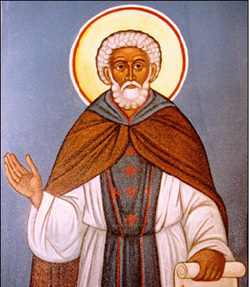
When he was eighteen, Benedict was given his freedom. He always helped the poor with whatever money he had. This led the people to call him " Il Santo Moro"—the Holy Negro. But there were also jealous people who made fun of Benedict. They insulted him because his parents had been slaves.
One day, a holy man was passing by and heard these men insulting Benedict. Turning to them, he said: "You make fun of this poor black man, but before long he will be famous."
Soon Benedict joined a group of hermits and was so virtuous that they chose him as their leader. When the Pope advised all hermits to join monasteries, Benedict became a Franciscan brother. He was made the cook in his monastery, but he also went out to visit sick people and prisoners. He comforted everyone in trouble and worked many miracles for the people of the surrounding villages.
When he was elected Superior, he guided the Community for three years with great wisdom, even though he could not read or write. They wanted to reelect him, but Benedict was so humble that he said he was not fit to remain in such a high office. His brothers had to give in to his humble request, so they made him Assistant Superior. He was asked to teach all the young men who joined the community how to become good Franciscans. Even though he could not even read, Benedict could explain the Bible and the catechism in a wonderful way, because of his great love for God.
After several years, Benedict asked if he might become cook again. When he was given permission, he went peacefully and happily back to his kitchen. There he spent the rest of his life, serving others with works of charity and prayer.
Let us remind ourselves that if so many became saints, we can become saints, too. It is up to us! To become saints, we do not need to have special qualities. So let us start now.
 RSS Feed
RSS Feed